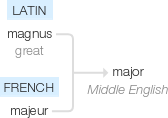Major
Middle English: from Latin, comparative of magnus ‘great’; perhaps influenced by French majeur .
wiktionary
From Middle English major, from Latin maior, comparative of magnus(“great, large; noble, important”), from Proto-Indo-European *maǵ-yes-(“greater”), comparative of *maǵ-, *meǵ-(“great”). Compare West Frisian majoar(“major”), Dutch majoor(“major”), French majeur. Doublet of mayor.
etymonline
major (adj.)
c. 1300, majour, "greater, more important or effective, leading, principal," from Latin maior (earlier *magios), irregular comparative of magnus "large, great" (from PIE root *meg- "great"). From 1590s as "greater in quantity, number, or extent." Used in music (of modes, scales, or chords) since 1690s, on notion of an interval a half-tone "greater" than the minor; of modern modes, "characterized by the use of major tonality throughout," by 1811. Major league, in baseball, is attested by 1892.
major (n.)
military rank above captain and below lieutenant colonel, 1640s, from French major, short for sergent-major, originally a higher rank than at present, from Medieval Latin major "chief officer, magnate, superior person," from Latin maior "an elder, adult," noun use of the adjective (see major (adj.)).
His chief duties consist in superintending the exercises of his regiment or battalion, and in putting in execution the commands of his superior officer. His ordinary position in the line is behind the left wing. [Century Dictionary, 1897]
The musical sense is attested by 1797.
major (v.)
of a college or university student, "focus (one's) studies," 1910, American English, from major (n.) in sense of "subject of specialization" (by 1890). Related: Majored; majoring. Earlier as a verb, in Scottish, "to prance about, or walk backwards and forwards with a military air and step" [Jamieson, 1825] a sense derived from the military major.
